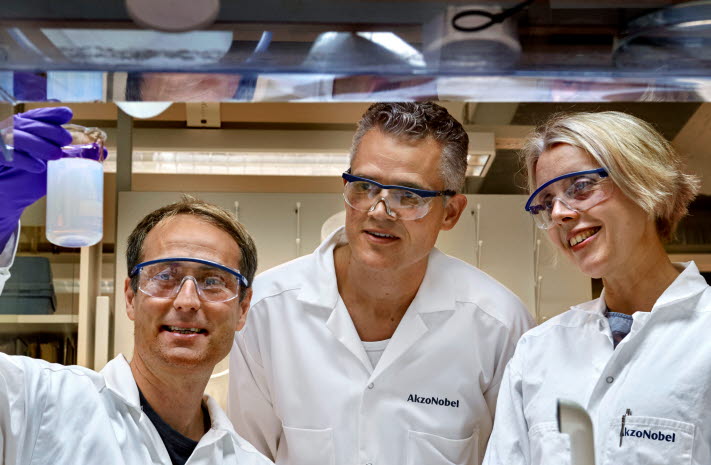When one of AkzoNobel’s chief chemical engineers in Sweden put a new paint formula to the test at the company’s laboratory in Bohus, 20 km north of Gothenburg, it turned out to be a master stroke for homeowners and the drive for sustainable living solutions.
By enriching outdoor paint with so-called colloidal silica, the paint acquired “self-cleaning” properties and a 25 per cent longer shelf life. This meant that mould, dirt, algae and other growth could easily be repelled from house façades in countries with cold climates.
Unsurprisingly, the Nordsjö One Super Tech self-cleaning paint became an instant best seller. But it’s just one of AkzoNobel’s many transformative products to have swept global markets in recent years as the company’s researchers – of whom at least 400 are based in Sweden – uncover new application areas for specialty chemicals.

“Our expandable microspheres are sun-reflective and widely used in cool roof coatings. They give homeowners in sunny and hot countries like Mexico a way to reduce indoor temperatures by up to 10°C which limits the need for air conditioning. This in turn lowers energy consumption and offsets carbon emissions,” explains Lars Andersson, Nordic Director, AkzoNobel Specialty Chemicals.
Green game changer
AkzoNobel is a Dutch multinational paints and specialty chemicals group which formed in 1994 from the merger of Akzo NV and Nobel Industries AB of Sweden. The company has 45,000 employees in more than 80 countries and innovation is the cornerstone of its business operations.
In 2017, AkzoNobel returned to the top of the influential Dow Jones Sustainability Index (DJSI) to lead the rankings for the fifth time. But it was a milestone year for investments too, not least in Sweden where the company announced a EUR 34 million expansion plan for three of its production facilities: Kvarntorp (10M Euro), Bohus (4M Euro) and Stockvik (20M Euro).
“Sweden is probably the best country in the world for cross-disciplinary research and seamless collaboration with academia. The expansion of our Swedish facilities means we are further investing in production staff and technology, while benefiting from unique R&D opportunities,” says Andersson.
During 2018, production at the Swedish sites will be ramped up to meet increased demand for three Specialty Chemicals product categories: chelated micronutrients, colloidal silica – of which AkzoNobel is the world’s biggest producer – and expandable microspheres.
These are steadily becoming essential ingredients in everything from agriculture and hydroponics to electronics, paints and food packaging as they enhance products and processes with clear sustainability benefits. AkzoNobel is on track to make 20 per cent of its solutions classifiable as ‘eco-premium’ by 2020, meaning that they exceed average green performance.
“Sustainability is not just good for the planet but for profitability as well. The Expancel microspheres we manufacture in Sundsvall can expand up to 60 times in volume when heated. This creates opportunities for developing lighter materials in the packaging industry. Every gram saved in e-commerce packaging results in substantial energy and environmental savings.”
Sweden sets R&D gold standard
Considering AkzoNobel’s long-standing ties to Sweden, the 2017 expansion announcements were not entirely unexpected. Approximately 20 per cent of AkzoNobel’s worldwide chemistry business is located in Sweden where the group employs 2,700 professionals at 12 locations.
By stepping up production capacity at the facilities in Bohus, Kvarntorp and Stockvik, customers in Europe can look to a future of short lead times. But according to Lars Andersson, the regionalisation trend and rewards of locating manufacturing closer to customers is secondary to the bigger catch for this multimillion Euro investment programme.
Sweden’s innovation strengths, he says, are taking centre stage and will enable AkzoNobel to continue to thrive in the long-term.
“Sweden’s research system is unmatched and very attractive for AkzoNobel. Sustainability frames the mindset here and decision paths are short. Universities are not driven by a desire to register patents, so companies can easily take part in R&D projects and file their own patents during product development. All of this creates a favourable landscape.”
AkzoNobel is now into its second year of a comprehensive partnership with Chalmers School of Technology in Gothenburg, to help renew the product portfolio on a running basis. Sweden’s west coast has become a perfect base for achieving this goal.
“I always say to young engineers that if they want to work with sustainability issues, they should aim for a career in chemicals. The applications are limitless,” Andersson concludes.
The expansion plan is expected to be completed at all three sites in Sweden by late 2018.





